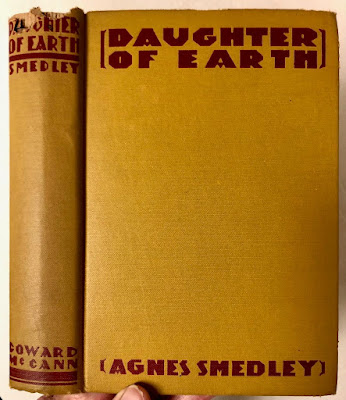“Daughter of the Earth,” by Agnes Smedley, 1929
Agnes Smedley is a mostly forgotten left-wing American
activist and writer. She is best known
for her reporting about the Chinese revolution.
Her second book, “Battle Hymn of China,” serves as a sequel to “Daughter
of the Earth.” Until the Nazi’s closed
the paper, she reported for the Frankfurter Zeitung on the Chinese Red Army,
and met Mao, Chou En Lai and Chu Te. She
then reported for other western publications, and wrote other books about the
revolution there. She is really the
female John Reed of the Chinese revolution, and was later black-listed for this
in the 1950s.
‘Daughter of the Earth’ concerns itself with the American period
before World War I until 1927. It is a
powerfully written semi-autobiographical novel of a working-class woman growing
up in a brutal, poor and conservative society.
It is as plainly written as Maxim Gorky or Jack London might do, missing the
similes or metaphors that litter more middle-class writing. There are no ‘the sun rose like the headlight
on an on-coming train’ in this book. Her
raw emotions and anger provide the fuel which carries you through most of the
book. She is an inchoate Emma Goldman, a
political Calamity Jane, her own person.
The fictional Marie Rogers was the daughter of poor farmers in
The most striking part of this book is how it describes a young
woman trying to keep her dignity in a society that just sees her as a sexual
target, a baby-maker or a weakling.
Marie has to fend off the advances of various drunks and those men drunk
on their own personalities. She avoids sex like the plague because she knows it
will lead to having a houseful of kids, beatings and misery. She hates marriage because she wants no man
telling her what to do. She is forever
being thought of as a prostitute or loose woman because she is not
married. The Christian religion is a
foreign thing to her, and she knows it to be hostile to the poor. She knows that only earning her own living
will give her independence. She dresses
atrociously, from both poverty and choice.
She carries a small gun and knife and travels from town to town
searching for knowledge – attending various schools, becoming a hardscrabble
teacher, trying to find someone she trusts.
She meets the various leftists of the day – working-class IWW members,
parlor Socialists, middle-class liberals and a few Communists, and has a natural
class feel for all of them.
Marie also feels the guilt of someone who wants to help her
family, but basically abandons her siblings and relatives to pursue her
life. There is a lot of ‘I’ in Marie,
which might have been her salvation. Her
emotions are always on the surface, she sees insults easily and deeply, she is
not afraid to tell people what she thinks without sugar-coating it. What she sees among the majority of working
people is that they do not have a clue why the world is the way it is. Food, drink, warmth, sex, money and music are
sufficient balms and concerns. Yet the
miners strike time after time against the bloodthirsty mining concerns. She slowly comes to a political consciousness
through study, her contact with leftists and the very material roots of her
miseries.
Marie eventually moves to New York where she works for a
book-reviewing publication, then “The Call” – a socialist newspaper, and also,
oddly, for the Indian independence movement.
Through her work with the Indians, she is arrested and sent to the cold
Tombs Prison – which she wryly notes is very close to Wall Street. There she is starved, interrogated and incarcerated as a ‘spy.’
It is only with the end of World War I that she is released. The socialists in New
York can’t understand why she would work for nationalist Indians,
but she (as Lenin would also have agreed) argues that freeing India Denmark
This book follows on the heels of the earlier American working-class
feminist classic, “Life in the Iron Mills.”
Novels by working-class people are rare, and ones that are political are
rarer still. This book is unique in its
class and feminist stance. It portrays a
lonely and tough female personality that one rarely encounters, except,
perhaps, in the pages of books. It is
our way of meeting Agnes Smedley herself, a real person.
And I bought it at May Day Books used/cutout book section.
Red Frog / February 23, 2013



No comments:
Post a Comment